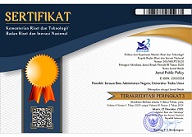Social Capital in the Sustainable Development Tourism: A Case Study of Penyengat Island National Cultural Heritage Area
Abstract
Tourism is one of the industries with positive growth and the most dynamic that can make tourism a key sector to encourage economic growth, especially in providing jobs, increasing regional incomes and people's living standards, as well as encouraging the development of other sectors economically. Pulau Penyengat, which is the center of Malay civilization both in language and culture, with a million potentials, as well as characteristics and historical values that support local wisdom and have an important influence on regional economic, social and cultural growth, requires integrated, comprehensive and sustainable effort to become a leading sustainable urban tourism destination. This study aims to explore the role of social capital in supporting the realization of sustainable urban tourism in Pulau Penyengat. The important findings in this research are (1) bounding social capital is a type of social capital that forms and develops in sustainable tourism destinations on Pulau Penyengat; (2) strong ties in the community system are based on values, culture, customs, and kinship relationships; (3) the community is convinced that social capital is the key to success in developing sustainable tourism, although objectively there is a tendency for social capital to fade due to internal and external factors.
Keywords
Full Text:
PDFReferences
Bakker, Y. W., Tatenhove, J. P. M. Van, & Koning, J. de. (2019). Resilience and social capital: The engagement of fisheries communities in marine spatial planning. Marine Policy.
Bennet, M. J. (2013). Basic concepts of intercultural communication (2nd ed.). Intercultural Press.
Bodosca, S., & Diaconescu, D. M. (2015). Tourism development after the implementation of sustainable strategies in Neamt County. Procedia - Social and Behavioral Sciences, 188, 230–236. https://doi.org/10.1016/j.sbspro.2015.03.378
Dewantara, M. H., Raeskyesa, D. G. S., Ali, A., & Nugraha, I. D. M. A. K. (2019). The Social Capital as Main Pillar for Tourism Industry. Conference on Culture, Technology, and Tourism (CTT), December.
Difrine Madara. (2019). The Concept of Community and Sense of Belonging. 7.
Emery, M., & Flora, C. (2006). Spiraling-Up: Mapping Community Transformation with Community Capitals Framework. Community Development, 37(1), 19–35. https://doi.org/10.1080/15575330609490152
Esther H.K. Yung, E. H. W. C. (2015). Evaluation of the social values and willingness to pay for conserving built heritage in Hong Kong. Facilities, 33, 76–98.
Fey, S., Bregendahl, C., & Flora, C. (2006). The Measurement of Community Capitals through Research. Online Journal of Rural Research & Policy, 1(1). https://doi.org/10.4148/ojrrp.v1i1.29
Fukuyama, F. (2000). Social Capital and Civil Society. IMF Working Papers, 00(74), 1. https://doi.org/10.5089/9781451849585.001
Gursoy, D., Jurowski, C., & Uysal, M. (2002). Resident attitudes: A structural modeling approach. Annals of Tourism Research, 29(1), 79–105. https://doi.org/10.1016/S0160-7383(01)00028-7
Halsall, J. (2014). The Re-Invention of Sociology of Community, International Review of Social Sciences and Humanities. 8(1), 91–98. http://www.irssh.com/volumes/vol_8_no_1_october_2014
Hasbullah, J. (2006). Social Capital (Menuju Keunggulan Budaya Manusia Indonesia). MR-United Press.
Hwang, D., & Stewart, W. (2017). Social Capital and Collective Action in Rural Tourism. Journal of Travel Research.
Kemenparekraf Nomor 12 Tahun 2020, PerMen N0.12 Tahun 2020 (2020).
Kusuma, A. F., & Darwanto. (2015). Nilai-Nilai Modal Sosial Yang Terkandung Dalam Perkembangan Pariwisata (Studi Kota Solo). Jurnal Bisnis Dan Ekonomi, 22(1), 65–84.
Mawardi. (2007). Peranan Social Capital dalam Pemberdayaan Masyarakat. Jurnal Pengembangan Masyarakat Islam, 5–14.
McCloskey, Donna Jo RN, Ph.D., (Chair), McDonald, Mary Anne DrPH, M., MPH, J. C., Suzanne Heurtin-Roberts, Ph.D., M., Stephen Updegrove, MD, M., Dana Sampson MS, MBA, Sheila Gutter, P., & Milton (Mickey) Eder, P. (2011). Community Engagement: Definitions and Organizing Concepts from the Literature. NIH Publication No. 11-7782, http: ⁄⁄www.cdc.gov/ phppo/pce/. http://www.atsdr.cdc.gov/communityengagement/pdf/PCE_Report_508_FINAL.pdf
Mccool, S. F., & Martin, S. R. (1994). Community Attachment and Attitudes Toward Tourism Development. Journal of Travel Research, 32(3), 29–34. https://doi.org/10.1177/004728759403200305
Mishakin, T. S., Razumovskaya, E. M., Berdnikova, O. A., & Ivanov, S. E. (2015). Prospects and Trends of Tourist Destination Development (as Exemplified in the Republic of Tatarstan). Procedia Economics and Finance, 26(October), 859–861. https://doi.org/10.1016/s2212-5671(15)00894-1
Nicholas, L., Thapa, B., & Ko, Y. J. (2009). Residents’ Perspectives of a World Heritage Site: The Pitons Management Area St. Lucia. Annals of Tourism Research.
Noventari, W., & Pratama, A. Y. (2019). Analisis Strategi Kebudayaan Dalam Undang-Undang Nomor 5 Tahun 2017 Tentang Pemajuan Kebudayaan Dalam Rangka Memperkokoh Bingkai Integrasi Nasional. Jurnal Ilmiah Hukum, 13(1), 1–14.
Okharedia, A. A. (2017). Promoting tourism in developing economies: Challenges and prospects. African Journal of Hospitality, Tourism and Leisure, 6(1), 1–11.
Postelnicu, C. (2016). Challenges and Development Prospects for Tourism in Romania. Ecoforum, 5(1), 227–231.
Putnam. (1993). What Makes Democracy Work? National Civic Review, 101–107.
Putnam. (1995). Bowling Alone: America’s Declining Social Capital. Journal of Democracy.
Rasoolimanesh, S. M., & Jaafar, M. (2017). Sustainable tourism development and residents’ perceptions in World Heritage Site destinations. Asia Pacific Journal of Tourism Research, 22(1), 34–48. https://doi.org/10.1080/10941665.2016.1175491
Rezazadeh, M. H., Zehi, F. H., & Rad, R. E. (2016). The Study of Moderating Role of Social Capital in the Relationship between Development of Urban Tourism and Sustainable Urban Development (Case Study: Zahedan). Current Urban Studies, 04(04), 461–475. https://doi.org/10.4236/cus.2016.44030
Sugiyono. (2015). Metode Penelitian Kombinasi (Mix Methods). Alfabeta.
Sugiyono. (2016). Metode Penelitian Kuantitatif, Kualitatif dan R & D. CV. ALFABETA.
Sunkar, A., Meilani, R., & Harini Muntasib, E. K. . (2015). Relevance of Social Capital for Community Empowerment and Conservation Education in Ecotourism Development of Rural West Java, Indonesia. ASEAN Journal on Hospitality and Tourism, 14(1), 13. https://doi.org/10.5614/ajht.2015.14.1.2
Tosun, C. (2006). Expected nature of community participation in tourism development. Tourism Management, 27(3), 493–504. https://doi.org/10.1016/j.tourman.2004.12.004
UNWTO. (2020). International Tourism Highlights, 2020 Edition.
DOI: https://doi.org/10.35308/jpp.v8i3.4611
Refbacks
- There are currently no refbacks.
Copyright (c) 2022 Surjadi, Hartuti Purnaweni, Muh Yusuf, Retno Sunu Astuti
p-ISSN: 2477-5738 I e-ISSN: 2502-0528 I DOI: 10.35308
Jl. Alue Peunyareng, Ujong Tanoh Darat, Meureubo, Kabupaten Aceh Barat, Aceh 23681, Indonesia
(0655) 7110535 l +621260313742 l +6285277110911
 is licensed under a Creative Commons Attribution-ShareAlike 4.0 International License
is licensed under a Creative Commons Attribution-ShareAlike 4.0 International License


